-
Cast lists of all three recordings
-
An introductory article about La Rondine
-
Act by act synopses with integrated reviews
-
Conclusions and Recommended Recording
Click here to see a general article on
the operas of Puccini
Cast Lists and Recordings References
Giacomo PUCCINI
(1858-1924) LA RONDINE - Lyrical comedy in three
acts
1) The 1997 EMI Recording (1917 version including the aria "Parigi")
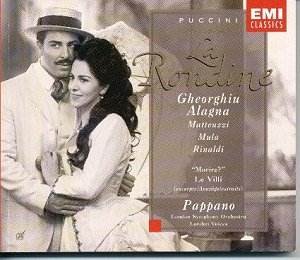
Magda…………………………………..Angela
Gheorghiu
Ruggero…………………………………...Roberto
Alagna
Prunier……………………………….
…William Matteuzzi
Lisette………………………………….…….…Inva
Mula
Rambaldo………………………………..…Alberto
Rinaldi
Recording also includes Puccini's "Morire?" and excerpts from
Le Villi
London Voices and the London Symphony Orchestra conducted by Antonio Pappano
EMI CDS5 56338 2 2CDs [120:39]
Yalplay
£24.27
Crotchet £25
Amazon
UK £27.99
Amazon
US $30.33
2) The 1983 CBS MASTERWORKS (SONY) Recording
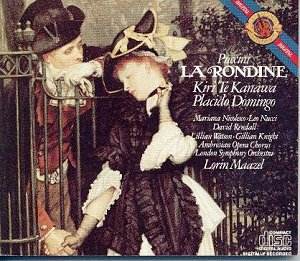
Magda…………………………………….Kiri
Te Kanawa
Ruggero…………………………….…….Placido
Domingo
Prunier………………………….……………David
Rendall
Lisette………………………………….Mariana
Nicolesco
Rambaldo…….………………………………….Leo
Nucci
Ambrosian Opera Chorus and London Symphony Orchestra
conducted by Lorin Maazel
CBS MASTERWORKS (SONY) M2K 37852 2 CDs [103:25]
Yalplay
£23.46 Crotchet n/a
Amazon
UK £25.99
Amazon
US $30.33
3) Live recording from Sala Grande del Conservatorio "G.Verdi" di Milano
1981 recording - originally FONIT CETRA now released by WARNER FONIT
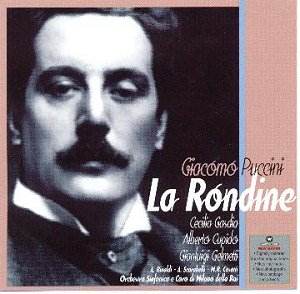
Magda
…………………………………………Cecilia
Gasdia
Ruggero……………………………………….Alberto
Cupido
Prunier…………………………………..…Max
René Cosotti
Lisette………………………………………Adelina
Scarabelli
Rambaldo………………………………….…..Alberto
Rinaldi
Orchestra Sinfonica e Coro di Milano della Radiotelevisione Italiana
Conducted by Gianluigi Gelmetti
WARNER FONIT 3984 27265-2 2CDs [106:34]
Yalplay
£14.98
Crotchet
£25 Amazon UK n/a Amazon US n/a
[N.B. - There is a 1966 RCA recording of La Rondine (GD60459), made by
Molinari-Pradelli conducting the RCA Italiana Opera Orchestra and choir;
but this has been deleted and was not available for review]
Puccini's La Rondine (The Swallow)
…Perhaps like a swallow,
you will migrate towards the sea,
towards a bright land of dreams…
"Child, love is in bloom!
Take care, take care of your heart!
Kisses and laughter must be paid for with teardrops!
Introduction
[There is a short essay on the operas
of Puccini included in the file on La Bohème which focuses on
comparative reviews of five leading recordings]
A glance at the catalogues, confirms that La Rondine has largely been
ignored by the recording companies. Despite the publicity it gained when
the big Act I aria, 'Chi il bel sogno di Doretta' was used in the film,
A Room With A View, only the four versions, above, are listed.
This is an appalling state of affairs since La Rondine is such an
appealing and accessible work. La Rondine was, in fact, very highly
esteemed by Puccini himself. The basic problem is that the work is something
of a hybrid, neither opera nor operetta, and as such it has fallen between
two stools, not really appealing to either faction and confusing the too
few production companies who have attempted it. Thus it was all the more
gratifying when the 1997 EMI recording starring Gheorghiu and Alagna won
Gramophone's top award as their 'Recording of the Year'.
The decision to include La Rondine after La Bohème in
our series of reviews of the operas of Puccini, was deliberate. Both operas
are set in Paris -- La Bohème in the 1830s of Louis Philippe, La
Rondine twenty years later in the reign of Louis Napoleon III. There
are similarities in plot and characters to such an extent that one might
regard La Rondine as a sort of sequel to La Bohème [see
inset below].
***** *****
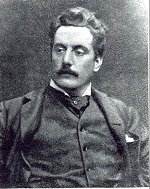
Giacomo Puccini
The whole concept and composition of La Rondine was a catalogue of
disasters!
La Rondine was composed as the Great War was raging, another reason for the
failure of such a delicate work. A work of, perhaps, too little consequence
for such grim times? The Austrians and Italians were, of course, on opposing
sides; but war for Puccini was something to hide from - as 'far away', and
as discretely as possible. The editor of a French publication went so far
as to accuse Puccini of writing not only an 'enemy opera' but also one which
would be 'treasonable' to stage in war-torn France. In response, the
ever-parsimonious Puccini, uncharacteristically, donated a year's profits
of Tosca performances in Paris, to France's wounded soldiers.
Interestingly, though, the world premiere of La Rondine took
place, in 1917, in neighbouring Monte Carlo! But Puccini was less inclined
to give up his relationship with a German baroness!
The concept of La Rondine dated back to when Puccini visited Vienna
in the autumn of 1913. He attended an operetta at the frivolous Karltheater
where he was taken on one side and invited to compose an operetta of his
own. A fat fee and the chance of a flattering award of the Star of the Order
of Franz Joseph were irresistible temptations.
 The Austrians clearly wanted what they were used to, i.e. - a German
operetta, intermingling spoken words and music in the style of Johann Strauss
and Franz Lehár.
The Austrians clearly wanted what they were used to, i.e. - a German
operetta, intermingling spoken words and music in the style of Johann Strauss
and Franz Lehár.
Puccini loved the latter composer but what he had in mind was something
different. When he accepted Vienna's offer of 200,000 kronen along with the
property rights, he asserted, "I will never write an operetta; a comic opera,
yes." It would be something like Der Rosenkavalier but more diverting
and more organic, he maintained. What he actually produced was more like
an elegant but more superficial La traviata, allowing his courtesan
heroine to remain poignantly but definitely alive at
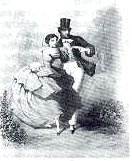 the end. There is also much in La Rondine, in the interweaving
of the relationships of the two pairs of lovers, that echoes his own La
Bohème and Johann Strauss's Die Fledermauss. One
will also detect echoes of Madama Butterfly.
the end. There is also much in La Rondine, in the interweaving
of the relationships of the two pairs of lovers, that echoes his own La
Bohème and Johann Strauss's Die Fledermauss. One
will also detect echoes of Madama Butterfly.
Liaison with potential Austrian librettists, performers, publishers, translators
and backers while Europe was at war was a nightmare. The death of Puccini's
publisher, Giulio Ricordi, in 1912, had hit Puccini very hard. Giulio, together
with Puccini's librettists Guiseppe Giacosa and Luigi Illica had formed,
with the composer, the quartet that had produced all the successful popular
Puccini operas. Giulio's son, Tito Ricordi, was of a different calibre -
a ruthless businessman without his father's artistic sensitivities. He was
unsympathetic and he made it quite plain that he was totally uninterested
in acquiring the Italian rights to what he called "Puccini's Austrian folly".
Ricordi's old rival, Edoardo Sonzogno jumped at the chance of acquiring a
Puccini opera and it was he who came up with the excellent diplomatic choice
of Monte Carlo for the premiere.
As usual, there was trouble over the libretto. Puccini rejected the first
Austrian attempt but accepted the second though his ignorance of the German
language meant there was much translation, back-translation and re-translation
necessary before acceptable German and Italian versions of the work would
be attained. Puccini's former librettist, Giuseppe Giacosa had died, leaving
just Illica who was now joined by a new name, Giuseppe Adami. As usual Puccini
was difficult about the progress of the libretto requesting alteration after
alteration, and he could never make up his mind about the ending - alternative
versions of it exist with different escape routes for Magda to escape from
her amorous predicament.
As preparations progressed, Puccini became more and more concerned about
the future of his creation so he shrewdly re-negotiated with his Austrian
contacts whereby he would retain only a half-share of the rights in exchange
for control of the premiere. In the event, the Monte Carlo premiere was
successful. The critic's were happy with the music and the audience, to Puccini's
delight, found La Rondine 'moving and comic' just as he had hoped
that they would.
But despite such good omens, La Rondine languished. The Italian critics
accused Puccini of being out of touch with the times. Bologna was not too
hostile but Milan was so vituperative that Puccini was jolted and decided
to rewrite it, but in vain. The problem, never really resolved, was that
last act which was seen to be something of a letdown after all the good tunes
and the two hit numbers of the first two acts.
La Rondine has never really advanced beyond the fringes of the Puccini
repertoire. Yet it has the most engaging melodies, sparkling orchestrations
and it is, as Conrad Wilson has said, "an elegant, fastidiously fashioned
opera that enabled Puccini to exploit a side of his musical personality he
was prone to neglect. In another perceptive article with the Pappano set,
Roger Parker observes, "There seems no doubt that the unusual plot
type…allow(ed) Puccini to discover some remarkably fresh musical colours,
(and so to release himself from that always-threatening sense of creative
paralysis)…most noticeable is the overall emotional restraint of the
score. In a few places we can hear a vocal intensity reminiscent of Tosca,
Butterfly and Fanciulla. But far more typical, are the gentle
endings to Acts I and III, no fortissimo enunciation of "the big tune", no
brass-reinforced whole-tone scales, but instead delicate orchestral combinations
that we need all our attention to appreciate. With this new tone often comes
a new harmonic language, sometimes a kind of chromaticism that startlingly
anticipates the style of American musicals decades later…"
It would be nice to think that we could look forward to sparkling stage
productions of La Rondine. For impressarios and producers,
a sympathetic production, not heavy-handed can be immensely rewarding.
| La Rondine - a sequel to La Bohème?
Many commentators have remarked upon the similarity of plot and character
between La Bohème and La Rondine. One of the
advantages of the Maazel set is its inclusion of an intelligent essay by
Barrymore Laurence Scherer, entitled "A Bird in a Gilded Cage".
Scherer remarks upon the resemblance between the two operas and suggests
that Magda might be Musetta twenty years on. She is now street-wise and
recognises that her love affair with Ruggero is probably her last fling.
She is also shrewd enough to realise, in Act III, that the writing is on
the wall when the money begins to run out, and she must face the more open-eyed
assessment of the mother of the love-blind Ruggero if she decides to go to
his village as his wife. Besides, she has the opportunity to return to her
Parisian comforts offered by her older, richer protector Rambaldo, who would
be delighted to take her back.
Scherer also suggests that Prunier is really Rodolfo, older and more cynical
but still "content to find amusement and gratification wherever it presents
itself. True to form, however, he remains powerfully attracted to pretty
women of the working class [Lisette]. Consciously or unconsciously, Puccini
carried through the Rudolfo-Prunier lineage by means of his vocal assignment
of the latter role: The full-throated tenor of La Bohème has
become a lighter, less powerful voice. Twenty years of sybaritic living have
taken their toll."
Then, finally, the merry crowds that thronged Bohème's Café
Momus during the reign of Louis Philippe now find their outlet at Bullier's.
But the music has become mellower and there is an underlying bitter-sweetness. |
Act by Act Synopses and Integrated
Reviews
Act I - Magda's salon, Paris early evening - during the time of Louis
Napoleon circa 1855-60.
As the sun sets, courtesan Magda is hosting a party for a number of friends
including Rambaldo, her protector, and Prunier, a poet.
The brief opening orchestral flourish sets the scene and the tone of the
opera. Pappano has all the necessary sparkle and polish, perfectly blending
romance, langour and irony (a hint of flighty birdsong). Maazel is a close
second but just misses Pappano's sense of exuberance and delight while Gelmetti
has the spontaneity and sparkle of a live performance.
There is an air of ennui. Then Prunier sets all the ladies aflutter when
he asserts that there is a new fashion in Paris for romance and if they are
not careful they will catch the love bug. There follows some mutual flippant
teasing between Prunier and the ladies, but Magda is inclined to take the
idea of love more seriously. Prunier then mentions Doretta, the heroine of
his latest lyric who has caught this bug. The ladies press him to sing of
her. There follows, as darkness descends and soft lights illuminate the room,
the famous 'Chi il bel sogno di Doretta' (Who can interpret Doretta's lovely
dream). Prunier sings of Doretta who is approached by a king who promises
her great riches if she will be his but she refuses "for gold cannot bestow
happiness". This lovely song is taken up by Magda who gives her interpretation
of Doretta's dream, about how she was made blissfully happy by a student's
kiss. Her guests are enchanted.
The role of Prunier demands a singer who can convey wry irony, pomposity
but with an urbane air, and yet tenderness too. All three tenors: William
Matteuzzi (Pappano), David Rendall (Maazel) and Max René Cosotti
(Gelmetti) are very good, all larger than life and all nicely expressive.
If I had to make a choice it would be Cosotti by a very short head over the
other two. Puccini very cleverly gives his hit tune, 'Chi il bel sogno di
Doretta' to Prunier first thus stoking up the emotional temperature in
anticipation of Magda's glorious rendering. [Compilation producers please
note, and include both tenor and soprano roles when contemplating this enchanting
aria.] Of the three Magda's, Gheorghiu sounds quite ravishing and Te Kanawa's
sends tingles up your spine especially when she so strongly projects those
top notes. I would not discount Cecilia Gasda either - her top notes are
equally thrilling and she sounds suitably girlish, and in love with the thought
of love. The live recording does betray a few quivers in her voice but I
will be kind and put this down to emotion - and, anyway this is engaging
in itself.
Magda is gently mocked by her friends. Her banker protector Rambaldo then
gives her an expensive pearl necklace. Magda is slightly taken aback, but
his generosity does not shake her faith in the thought of true romance. Lisette,
Magda's maid enters like a whirlwind and tells Rambaldo that a young man
is outside seeking him. With
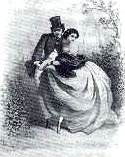 Magda's permission, Rambaldo agrees to see him. This exchange is
accompanied by music very reminiscent of Richard Strauss in Der
Rosenkavalier mode. It should be said, at this point, that Puccini's
music for La Rondine is very much based on waltz rhythms in deference
to Viennese tradition. The role of Lisette calls for an outgoing streetwise
charmer. I was less impressed by Mariana Nicolesco (Maazel), who sounds a
tad too matronly in the role, than by Inva Mula (Pappano) and especially
by the mischievous and youthful-sounding Adelina Scarabelli (Gelmetti).
Magda's permission, Rambaldo agrees to see him. This exchange is
accompanied by music very reminiscent of Richard Strauss in Der
Rosenkavalier mode. It should be said, at this point, that Puccini's
music for La Rondine is very much based on waltz rhythms in deference
to Viennese tradition. The role of Lisette calls for an outgoing streetwise
charmer. I was less impressed by Mariana Nicolesco (Maazel), who sounds a
tad too matronly in the role, than by Inva Mula (Pappano) and especially
by the mischievous and youthful-sounding Adelina Scarabelli (Gelmetti).
Magda's friends say she is very lucky to have Rambaldo but she replies in
another wonderful extended melodic aria, 'Denaro! Nient' altro che denaro!'
(Money, money, money). In it, she remembers, with affection, a brief romantic
meeting, long ago, with a student at Bullier's, a popular Parisian nightclub.
Gheorghiu reminisces tenderly, lightly as if in a dream, recalling the evening
and vaguely wondering how she got there and how she left - a radiant reading
with Pappano contributing a spellbinding atmosphere. Te Kanawa is rather
too intense but her aria is floated by another sensitive accompaniment from
Maazel. Gasdia is magically poignant too, she has a fine sense of this aria's
line and waltz rhythms.
The ladies are disappointed at the inconclusive ending to Magda's story and
so the conversation turns to fortune-telling. A screen is brought out and
to some oriental-like music Prunier begins to tell the ladies' fortunes.
He tells Magda, somewhat ambiguously, that like the swallow she might find
a brighter future in the sun but there could also be impending tragedy. Puccini's
scoring for this brief delicate aria is sublime in its intimation of anticipated
joy and sadness. Earlier, there had also been another brief but fascinating
aria for Prunier when he had enthused about famous femme fatales that he
would liked to have known including Salome at which point, Puccini slyly
quotes from Richard Strauss's opera.
In the meantime, Ruggero has entered with a letter of introduction from his
father to Rambaldo. This is Ruggero's first visit to Paris and he is eager
to know where to go to celebrate on his first evening. At this point the
fortune telling session concludes and many of the guests come forward to
see Ruggero. Prunier cynically recommends that Ruggero goes to bed on his
first night. Lisette and the ladies remonstrate heatedly and advise the young
man to go to Bullier's. The appearance of the opera's hero, Ruggero, in Act
I, is unusually brief, very brief even; for after receiving this advice,
he leaves the stage until Act II. But in the original 1917 version, the one
used by Pappano, an extra aria is included allowing Ruggero to enthuse on
the anticipated delights of the City of Lights. Accordingly, Alagna seizes
what frankly is a rather thin opportunity.
Rambaldo and the other guests then leave. Magda tells Lisette she will be
staying in and that she can take the evening off. Magda muses over her fortune
as foretold by Prunier and notices the list of nightclubs that was drawn
up while she was out of the room. She spots Bulliers and runs out excitedly.
Now, Lisette, smartly dressed after borrowing some of her mistress's clothes,
furtively returns to meet Prunier whose earlier taunting of her has really
been a smoke screen, for he is her lover. He criticises bits of her costume
and makeup and while she is attending to them, he confides that he is slumming
in associating with her but, despite himself, he loves her madly. At length,
they leave billing and cooing. This is an amusing and charming duet and both
Matteuzi and Mula, and, especially, Scarabelli and Cosotti score heavily
here.
The first act ends with Magda now dressed almost unrecognisably as a grisette
hurriedly leaving after them to the bitter-sweet strains, in the orchestra,
of Doretta's song.
Act II - later that evening at Bullier's night club, Paris
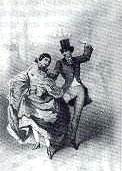
The second act opens ebulliently with merrymaking at Bullier's. Crowds dance,
drink champagne, romance and flirt. Puccini's sparkling high-spirited music,
for chorus and orchestra, is performed brilliantly by Pappano's team. Maazel
is close behind. Although Gelmetti is not so polished, there is a delightful
spontaneity about his reading which is equally irresistible. The music quietens
as Magda, in her disguise, enters, immediately attracting the amorous attentions
of a group of students. When she catches the eye of Ruggero, they escort
her to his table thinking she is his 'date'. Puccini writes some deliciously
tender and 'mock' innocent music for her entrance and all three conductors
catch the mood well.
Ruggero invites Magda to sit with him and he tells her that she seems timid
and alone and that she reminds him of the girls of Montauban, his village
- "beautiful, simple and modest." to a charming little tune that has a
delightfully subtle rustic flavour. He then invites her to dance to the lovely
strains of 'Nella dolce carezza della danza' (In the soft caresses of the
dance). Gheorghiu and Aalagna sing as though they are transported, with a
ravishing dream-like accompaniment from Pappano. It goes without saying that
Te Kanawa and Domingo sound marvellous too, but they are somewhat mature
for Puccini's delicate scene of love's first blooming. The freshness and
magic of the EMI set is missing. I liked very much, on the Gelmetti recording,
Gasdia's shy and tentative first approaches to her Ruggero - sung by a
sincere-sounding if slightly disappointing Alberto Cupido. He rather overwhelms
his partner in the first part of 'Nella dolce…' Magda and Ruggero dance
out into the garden area of the nightclub as the other revellers dance around
them The dance reaches a huge ecstatic climax (again Pappano triumphing).
Meanwhile Lisette and Prunier have arrived and, immediately, the possessive
Prunier accuses Lisette of flirting provocatively.
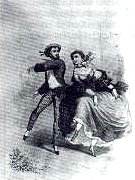
Somewhat exhausted Magda and Ruggero return to their seats. Ruggero orders
drinks and Magda asks him to give the waiter twenty sous and let him keep
the change - her reminiscences of the young student she had met all those
years before are being awakened to become reality. Ruggero is captivated
and declares that when he falls in love it will be for life. They write their
names on the table but Magda, ever practical, says the image will rub off.
Ruggero responds by saying, "something quite different will stay with me
your secret." Clearly deeply moved, Magda pleads him "to accept me as fate
has brought me to you." Gheorghiu is deeply touching here, tenderly and just
slightly motherly, a beautiful moment. This leads into another gorgeous duet.
Ruggero leads by replying "Io non so chi siate voi…' ("I don't know
who you are or how you came to be here with me but…"). The orchestra
takes up the melody of this short but exquisite duet with whispering on-lookers
noticing how the pair are falling deeply in love. Once more it is Gheorgiu
and Alagna who impress most here.
Then Lisette and Prunier notice them. Comedy follows with Magda determined
to conceal her true identity from Ruggero and indulging in a deliciously
farcical and ironic exchange with Lisette about the clothes that her maid
has 'borrowed' from her wardrobe to wear to Bullier's. Gelmetti's girls are
outstanding here, the live spontaneous stage situation clearly helps! Now
follows yet another highlight - an ecstatic quartet between the two pairs
of lovers with the on-looking revellers again forming a chorus. Both the
Pappano and Maazel readings thrill.
But things are brought back to earth with the arrival of Mazda's protector,
Rambaldo. Prunier espying him, and anxious to protect Magda's new love, gets
Ruggero to take Lisette out of sight on the pretext that Rambaldo is her
master and would not want to find her there. Prunier also warns Magda to
escape too but she stands firm and faces Rambaldo to declare her new love
and to tell him that all is over between them. Dejectedly Rambaldo leaves
warning her she will regret her decision.
The stage empties. The revellers leave as dawn approaches. Drained, Magda
sinks into a chair and stares fixedly ahead as if questioning her destiny.
The hall is now empty. The first cold rays of morning show uncleared tables,
crushed flowers and upset glasses. "All the infinite sadness of a party which
is over is caught in this early morning light." Now Puccini delivers a
masterstroke. A voice is heard singing in the street as the sounds of an
awakening Paris are heard. At just the right distance, and accompanied by
a whistling companion, so as to add just that heightened bit of poignancy,
Pappano's female off-stage singer touches on the inevitable sadness of love
-
"I am the dawn, which is born only to dispel any magic of the moonlit night!
Do not trust in love!"
But the final moments of Act II end on a happier note as Ruggero rejoins
Magda and they embrace. But Magda shivers and murmurs "I'm afraid! I'm too
happy!"
Act III A villa on the Riviera
Magda and Ruggero have fled to a haven in the South of France. Act III opens
with a short Debussy-like orchestral evocation of a languid scented garden
overlooking a heat-hazed sea. Both Pappano and Maazel excel with the latter's
colours just that bit richer. As if echoing this evocation, Magda muses
contentedly, "Do you hear? Even the sea breathes quietly. The air drinks
in the perfume of the flowers". The two lovers relax contentedly. Puccini
recapitulates much of the music that he has used in Acts I and II but the
sense of urgency has been dispelled; one gets the impression that their love
has softened but deepened, yet Ruggero seems as ardent as ever but is now
eager to settle down. In this early episode Te Kanawa and Domingo are more
memorable with Gasdia disappointingly, momentarily off pitch (again one must
remember this is a live performance).
In their bliss, Ruggero, reveals that he has written to his father asking
for money (the couple's creditors are pressing in) but more importantly for
permission to marry. Ruggero reaffirms that he wants one love for life and
in a warmly sentimental aria, sung with sensitivity and tenderness by all
three tenors, he looks forward to them living in the village of his parents
and starting a family. At first Magda is enraptured and snuggles up to her
lover, but when he goes off to see if a letter has arrived, she hesitates
and is filled with fear. What about her past as a kept woman? Should she
conceal it or confess. She exits in anguish.
Lisette and Prunier now make an appearance. At once they begin to squabble.
They had come to Nice to pursue an on-stage singing career for Lisette. Alas,
she had failed hopelessly and they had fled the town with derision ringing
in their ears. Lisette is paranoid about this and thinks there are more people
deriding her around every corner. Prunier is unsympathetic and bitterly
disappointed that his woman has failed him. As for Lisette, herself, all
she wants is peace and a return to the simple life of a maid. This rather
inflated scene tends to slow up the action, although the Scarabelli and Cosotti
compel on the Gelmetti recording.
Prunier then espies the Maitre D'Hotel and asks to see Magda. When she comes,
he first of all suggests that Lisette resumes duties as Magda's maid, an
arrangement that suits both women, and then he reveals the real reason for
wanting to see Magda. He tells her he thinks she is living in a fool's paradise,
that her real place is back in Paris and that "someone is waiting for you,
who knows your troubles and is ready to serve you in any way!" - clearly,
this is Rambaldo. Having delivered his message he prepares to depart. Even
though both he and Lisette have sworn they never want to see each other again,
they arrange to meet at 10 o'clock that evening. Now, in a happier frame
of mind, Lisette dons her maid's uniform, fusses around a bit and exits.
Ruggero returns in great excitement with a letter from his mother. He persuades
Magda to read it. She does so and is greatly moved by its sentiments, his
mother wanting Ruggero to kiss his chosen bride for her. All three sopranos
are most touching here with Gheorghiu especially wringing the heart. But
Magda shrinks from accepting the mother's kiss and confesses, "I have passed
in triumph between shame and gold". Ruggero, at first cannot believe her
and is then torn between anger and anguish. The music becomes more dramatic
and anguished, culminating in Ruggero's heart-rendingly beautiful aria Ma
come puoi lasciarmi' (But how can you leave me) with both Alalgna and Domingo
bringing tears to the eyes. But Magda is resolute in her sacrifice of love
and she persuades him to forget her and let her take the sorrow on herself.
Lisette enters and guesses intuitively what has happened. She comes forward
to support and lead a distraught and tearful Magda away. The curtain falls
with Ruggero sunken, head in hands and Magda, off-stage sadly murmuring
Ah!…
Bonus Material- Pappano Recording
Morire?
Le Villi (excerpts)
The EMI set comes with an additional twenty-five minutes or so of extra Puccini.
Robert Alagna sings beguilingly the haunting but rather elusive song
Morire? (To die?…). this is followed by four excerpts from Act
II of Puccini's early opera Le Villi set in the Black Forest.
First comes the Prelude that begins serenely and tenderly romantic with a
typical broad Puccini melody that speaks straight from the heart before the
music ends on a somewhat tense note. In 'Ecco la Cassa dio' (Here is her
house), Roberto (Alagna) has jilted his sweetheart in favour of the charms
of a siren. He returns to the home of his sweetheart hotly pursued by the
Willis (the ghosts of jilted maidens). In this dramatic aria he cries out
in terror and remorse for his treachery. In 'Torna ai felici di Dolente il
mio pensier' (My anguished thought returns to those happy days…) he
remembers happier times in a heart-rending and passionate aria that anticipates
the best of the later operas. 'L'abbandono' (Parte Sinfonica 1) is mainly
instrumental and underscores a scene where the heroine is laid to rest. This
radiant evocation is heightened by voices singing, "…O purest maiden,
rest now in peace!" Finally, another orchestral interlude, 'La tregenda'
(Parte Sinfonica 2) brings the music to an exciting conclusion.
Conclusion and Recommended
Recording
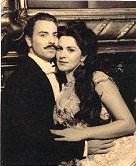
I will readily confess at the outset that I have always had a great affection
for Puccini's La Rondine and if I had to make a choice between all
his operas to take with me onto a desert island, then I would be greatly
tempted to choose this one.
I believe the Gramophone critics were right to choose to honour the
Pappano recording so highly. Without a doubt, it is the most colourful, most
vibrant and most moving of the versions reviewed above. But having said that,
wild horses would not part me from the other two versions. Maazel offers
much warmth and although the combination of Te Kanawa and Domingo seems,
for me at any rate, too mature especially in the gayer more extrovert first
two Acts, one cannot deny their charisma. I would not like to be without
the charm and spontaneity of the Gelmetti recording either. I liked Cecilia
Gasdia's Magda (with a few reservations here and there) very much and I admired
the urbanity of Max René Cosotti's Prunier.
Reviewer
Ian Lace
See also Comparative review of La
Bohème
